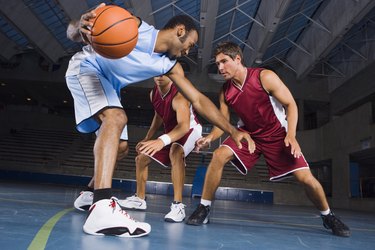
When the final whistle sounds at a basketball game, your responsibilities to defend an opponent and execute your team's offense are replaced by your responsibilities to care for your own body. Following healthy post-game recovery techniques will do more than ward off feelings of muscle fatigue and stiffness. Proper recovery will also refresh your body for your next practice, game or tournament and keep you performing at your best.
Why Muscles Hurt
Video of the Day
As you dribble, sprint, slide and leap across the basketball court, the muscles in your body contract repeatedly, causing microscopic tears in muscle fibers and tissue. While your body does its best to keep muscles fueled with blood and oxygen using its inner energy reserve of glycogen, it also produces a waste product known as lactic acid. The cumulative effect of inflammation from tiny muscle tears and the buildup of lactic acid results in delayed onset muscle soreness, or DOMS, a sensation of muscle pain that can linger for 24 to 48 hours after your game ends.
Video of the Day
Post-game Stretching
When the clock runs out on an intense game, your first instinct may be to slump into a seat in the locker room. However, suddenly stopping muscle movement after a bout of intense exercise such as a basketball game can worsen DOMS. After cooling down for five to 10 minutes, spend about 10 minutes stretching to promote blood flow to contracted muscles and prevent fatigued muscles from stiffening. Stretch lower-body muscles such as your hamstrings, quadriceps and calves as well as upper-body muscles in the shoulders and arms, gently holding each stretch for up to 30 seconds. Consistently stretching after a game will improve your muscles' range of motion and reduce your risk of injury the next time you step on the court.
Nutrition and Hydration
Within an hour after the end of your game, eat a post-game meal or snack to replenish your lost stores of carbohydrate energy and add a small portion of protein to speed up muscle recovery. The number of grams of carbohydrates you eat in a post-game meal should equal half of your body's weight in pounds, while your protein intake should comprise about a quarter of your meal. You should also drink plenty of water -- which comprises about 75 percent of your skeletal tissue -- to replace fluids lost through sweat during a game. To accurately gauge how much water to drink, weigh yourself before and after a game or practice, then drink approximately 24 oz. of water for every pound lost during game play.
Sleep
The adrenaline rush of a basketball game may leave you feeling wired after a game ends, but once you have cooled down, stretched and eaten a post-game meal, you should next focus on giving your body the sleep it needs. Aim for eight to nine hours of sleep per night, which will allow your body to repair its tired muscles, produce muscle-growing hormones, replenish glycogen stores and strengthen your immune system.